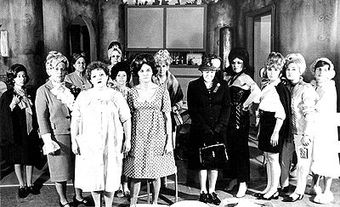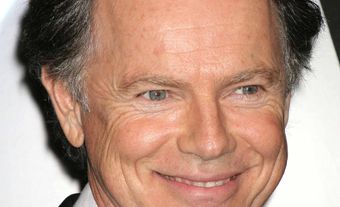This article was originally published in Maclean's Magazine on October 14, 2013
Michael J. Fox was having quite the week. It began with the Emmy Awards, where he received a standing ovation for just showing up—introduced by a sardonic Jimmy Kimmel as “a man nobody likes.” Fox was there to eulogize the late Gary David Goldberg, who wrote and produced Family Ties and Spin City. But the audience was cheering for his remarkable comeback to prime-time comedy with The Michael J. Fox Show , which prefigures just such a moment: He plays Mike Henry, a news anchor with Parkinson’s disease who’s making his own TV comeback, and dreads the inevitable standing ovation that greets him the moment he steps into the newsroom.
“The show is very meta,” Fox admits, interviewed in his Manhattan office on the eve of his sitcom’s network premiere. He had a full day. It began with him chatting to Howard Stern about how Parkinson’s affects his sex life, and would end with him wrapping his arms around Jimmy Fallon for a mock slow-dance on late-night television. In a week when everyone was talking about the final episode of Breaking Bad , Betsy Brandt—who had endured five seasons on that show as the wife of a hard-assed narcotics agent—was expressing relief to have Fox as her new TV husband. Even if he’s on the cover of Rolling Stone in a black leather jacket with a headline proclaiming him “the toughest man on TV.”
There may be no second acts in American lives, as F. Scott Fitzgerald famously said, but America’s best-loved Canadian has defied the odds. Once again, he’s proved he can go back to the future. This time, his vehicle is the battered prime-time schedule of NBC, the same network that made this kid from Burnaby, B.C., a star on Family Ties three decades ago. In his new fake family, Fox, 52, plays father to three children—one fewer than he has with his wife, actress Tracy Pollan. And he’s been getting a curious kind of déjà-vu. “It’s cool to be the dad,” he says. “I find myself passing by a mirror and think I see Michael Gross [his father on Family Ties ].”
Despite some token postmodern conceits—characters talk to the camera, as in Modern Family and The Office —the actor’s new show is the most traditional family sitcom to hit network television in ages. In a landscape of gay, single, divorced or addicted parents, he has rallied one of TV’s last old-school nuclear families around the dinner table, drawing on material from his own life. But then, what other fiftysomething Hollywood star is still happily married to a woman who was cast as his sitcom girlfriend when he was just 24?
Much has happened since. In 1990, just months after the release of the final film of his Back to the Future trilogy, Fox started showing his first symptoms of Parkinson’s. After keeping his disease in the closet as long as he could, he finally went public in 1998, then bowed out of Spin City two years later. His tearful farewell to the studio audience on the show’s finale seemed to herald the end of his acting career. When I last interviewed him, in 2002, he ventured that he might, might , return to acting in his 50s—“if there’s a cure, which is possible or, more likely, some kind of breakthrough in therapy.”
Fox busied himself writing three bestselling memoirs that strike a deft balance between droll self-deprecation and inspirational philosophy. He also raised $350 million for the Michael J. Fox Foundation for Parkinson’s Research. So far, it has produced no cure. But well before turning 50, Fox defied his own prognosis to reinvent himself as an actor, with guest roles on Scrubs, Boston Legal, The Good Wife —and Rescue Me, for which he received his fifth Emmy. Now he’s riding a wave of goodwill, and some skeptical reviews, with his first starring role in 13 years.
His office is the same one I visited in 2002, a sidewalk-level suite in a grand apartment building that overlooks Central Park on the Upper East Side. Fox lives on one of the higher floors with Pollan and their 12-year-old daughter, Esmé, named after a J.D. Salinger story. Their son, Samuel, 24, and their 18-year-old twins, Aquinnah and Schuyler, have moved out. As I wait in an anteroom surveying a wall of eight honorary degrees, Fox bounds out of his office and offers a handshake so firm, it would make a politican proud. In dark blue jeans and a matching T-shirt, he looks tanned and fit, heavier than when we last met, but not visibly older. He actually appears healthier—remarkable for someone with a degenerative disease.
As Fox plants himself in the centre of a leather couch, nestled between a pair of pillows, his head and arms constantly bob and weave—dyskinesia brought on by the medication he takes to unfreeze the paralyzing grip of Parkinson’s. But his legs are more stable than last time we talked. Amid the thresh of limbs and the tumbling cadence of words racing to catch up to his thoughts, he speaks with articulate precision. And when he pauses to listen, his slate-blue eyes hold a steady focus that seems to anchor his whole body in a moment of stillness.
He’s learned to fine-tune the dosage of his meds. On this heavy media day, he says, “I’ve taken a lot, so I’m a little dyskinetic. It becomes really important on a day like today to read the signs—this intuitive feeling. It’s like dogs that howl before an earthquake. My inner dog begins to howl and I ignore it at my peril.”
Beside bookshelves stacked with Emmys, and framed photos of Fox jamming with Bruce Springsteen and the Who, a pair of electric guitars are propped in a corner next to an amp. Every year, he explains, his foundation stages a benefit concert, and he gets to sit in with a rock star for a song. “Chris Martin of Coldplay is doing it this year. I have the guitars out in the hope that I’ll learn Yellow and play with him.” I wonder how the meds affect his playing. “If I’m not medicated right,” he says, “there can be a certain rigidity. I need to be in this not-quite-there, nebulous space between on and off, and then I kick ass. This happens, like, once every three years.”
The dyskinesia is a workout of sorts. “My whole body is an isometric exercise, always pushing against something and finding its place in space.” And Fox has grappled with motor control in everything from hockey to golf. His legs work better skating than walking, he says, “because it’s not picking them up and putting them down.” And his frequent golf partner, actor Clark Gregg ( Agents of S.H.I.E.L.D. ), “said I golf like I have a foot on each platform of two subway cars, each moving independently.” Yet Fox shoots in the high 90s or low 100s. “It’s just a stick-and-ball sport,” he says. Skeet shooting was another revelation. “The look on people’s faces when I was handed a loaded shotgun was precious,” he recalls. “But I knew, when I brought it to my shoulder and the skeet went up, that I’d blow it to pieces. I destroyed it. That moment is all that matters. I don’t have to worry about before or after.”
He has a similar attitude to acting. “I wouldn’t be so hard on myself to say I had a bag of tricks,” he says. “But I had go-to stuff, whether it was physicality, facial expression, inflection or whatever—an actor’s arsenal. Now I don’t have the luxury of constructing an approach. I just have to see what the hell happens. I may not manipulate a prop, because by the time I get to the cupboards, I may not be able to. It’s opened me up to the stark honesty of the moment.”
As for sexual motor control, a topic Fox has mined in his sitcom, he says, “There’s always a pre-conversation about who’s going to be the agent of motion.” That morning, talking to Stern about masturbation, “I said it’s like a bad hand job, because it’s doing whatever it’s doing and you can’t say slower, faster—it’s just going to happen.” Fox laughs, but then turns philosophical, and points out the great paradox of Parkinson’s: “I couldn’t be still until I couldn’t be still.”
When I first met Fox on the set of Family Ties in 1987, he was like a hyperactive kid. He chugged cans of Diet Pepsi and kept ducking out of the studio to chain-smoke Export ‘A’s, lighting one off another. During a lunch break, he hopped into his black Ferrari and drove me to his house at twice the speed limit on the freeway, his seatbelt unbuckled, the car floor littered with beer cans. He struck me as an accident waiting to happen.
Four years later, soon after turning 30, Fox hit the brick wall of his Parkinson’s diagnosis and spiralled into depression and heavy drinking. He has been sober since 1992. He won’t even use medical marijuana, which can be prescribed for Parkinson’s. “It conflicts with my sobriety,” he says. “I got a feeling if I had a joint I’d be in Vegas in six hours—‘I’m high now, so why don’t I have a beer?’ ” Besides, he adds, even dead sober, “I can slur my speech, lose my balance and have cognitive lapses, so why would I want to?”
After Fox had eased back into acting, working around his condition, Larry David showed him how he could incorporate it into a role. In a 2011 episode of Curb Your Enthusiasm , Fox portrayed himself as a neighbour whom David accuses of exaggerating his symptoms to manipulate sympathy. “Larry’s a genius,” says Fox. “He took me to the next level of understanding, which is how people’s projections are sometimes more difficult than the condition itself. Larry made me realize it’s okay to laugh at Parkinson’s through the perspective of the person who has it.”
It took a young filmmaker, Will Gluck (Easy A), to make Fox realize that the motherlode of anecdotal material in his books could fuel a family comedy. When they pitched the idea with fellow executive-producer Sam Laybourne, all the networks were game. But only NBC offered 22 episodes. “We said, ‘Wow, is that a sign of their desperation?’ ” the actor recalls. “Should that be a red flag? No, that’s what we’re here for. It made me say, ‘Am I just pissing around or am I up for this?’ ”
Fox has recruited a top-notch cast, with Brandt as his wife, Charles Grodin and Candice Bergen as his parents, and Wendell Pierce (The Wire) as his newsroom producer. And in a cute touch, in one episode, his character gets a crush on a neighbour played by Pollan. Was there ever a thought of casting her as his TV wife? “We had that conversation,” he says, “but it would become like the snake eating its own tail. We have such a good time in our marriage. To put something on it like that would be an unneccessary strain.”
The show has received more than a few negative notices. Critics tend to find it too safe and cozy—one compared it to “meatloaf”—but most are still impressed by how Fox’s quicksilver comic timing seems undiminished. And he inspires such goodwill that even the harshest critics pray that the show will find its feet—and pity the poor network executive who might have to pull the plug.
Fox is not just beloved; he could give a master class in celebrity behaviour. When I suggest he could give some tips to Justin Bieber, he shakes his head. “There’s so much pressure now. If they had iPhones with cameras when I was coming up, I’d still be in jail. With Woody Harrelson and Robert Downey Jr., we could just roam the streets. That can’t happen any more. Factored in is this feeling that you’re going to get busted and shamed anyway, so you might as well just do it.”
Fox displays an ingrained Canadian modesty that Bieber seems to have wiped from his DNA. He agrees that “the Bieber thing certainly seems at first blush to be un-Canadian ish —I don’t want to say un-Canadian or question his patriotism. But I’m not outraged by it. The thing about celebrity [that] people have to remember is that a celebrity doesn’t own that celebrity. I don’t own mine. It’s a function of what people think of me and what I’ll put up with. Younger celebrities who have this narcissism, they don’t get that, and the people who get upset about them still avail themselves of all this TMZ culture.”
Fox is now a U.S. citizen—“I wanted to have a vote and influence the country my kids live in”—but he says he feels as Canadian as ever. “There’s something about the country, the clusters of people, the way they rely on each other in an unspoken, uncelebrated way.” He recalls an old CBC radio contest that asked listeners to complete the phrase “as Canadian as . . .” The winning answer was “as Canadian as possible under the circumstances.” Which suits him just fine. “I could say, ‘Yes, I’m gracious, polite, conscientious, hard-working . . . I’m Canadian.’ But it’s not something you celebrate; it’s inherent.”
Fox’s other deep-rooted identity is Parkinson’s, a fate he insists he would not want reversed. “It sharpened my sense of humour, my sense of gratitude, my opportunity to serve a wider community, my skills as a parent. It’s sharpened my moderate expectations of where a marriage should be; it’s not a constant fight for territory, it’s about increasing that middle ground where you let each other off the hook and have empathy.” Parkinson’s, he admits, “is the gift that keeps on taking—but it’s been a real gift to me.”
Our interview has stretched well into overtime. Fox will have to retune his meds and gear up for Jimmy Fallon. Ushering me out with warm thanks, he asks how I’ll spend the rest of my day. His concern seemed genuine. The last time we met, he recommended a restaurant, then showed up there unannounced to join me for lunch. These days, his future is moving faster. Once again, the business of being Michael J. Fox is a full-time job.
Maclean's October 14, 2013

 Share on Facebook
Share on Facebook Share on X
Share on X Share by Email
Share by Email Share on Google Classroom
Share on Google Classroom


